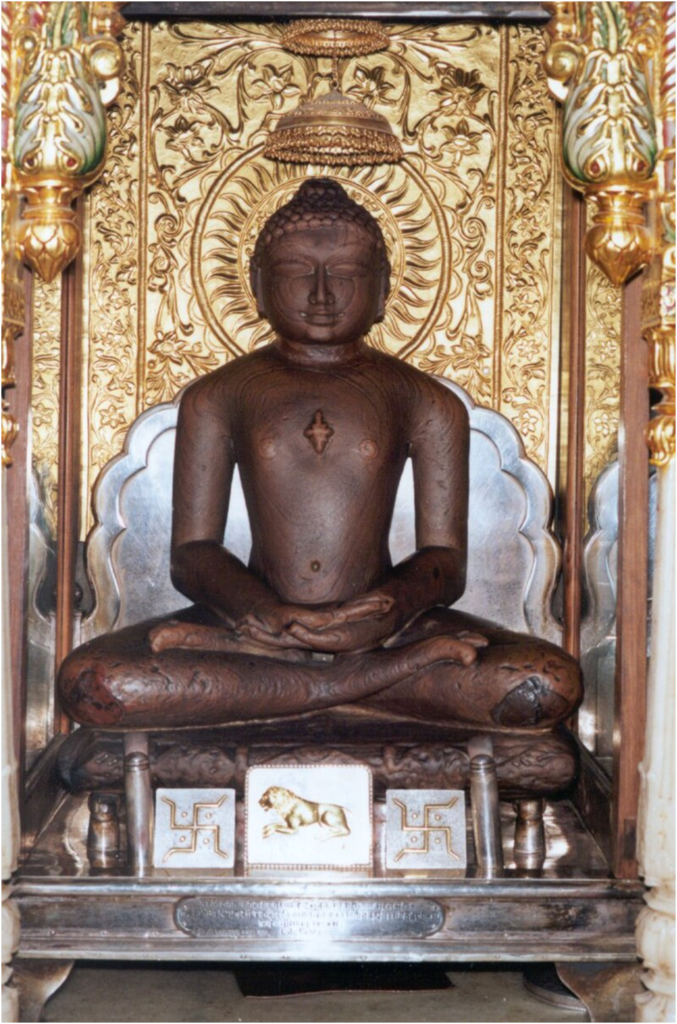The Jains do not believe in the Vedas, but they admit the existence of a soul. They also agree with the orthodox tradition that suffering (pain) can be stopped by controlling the mind and by seeking right knowledge and perception and by observing the right conduct.
The Jaina philosophy was first propounded by the tirthankar Rishabha Deva. The names of Ajit Nath and Aristanemi are also mentioned with Rishabha Deva.
Must read: Similarities and differences between the basic tenets of Buddhism and Jainism
There were twenty-four tirthankaras who actually established the Jaina darshan. The first tirthankar realised that the source of Jaina philosophy was Adinath. The twentyfourth and the last tirthankar was named Vardhaman Mahavira who gave great impetus to Jainism.

Mahavira was born in 599 BC. He left worldly life at the age of thirty and led a very hard life to gain true knowledge. After he attained Truth, he was called Mahavira. He strongly believed in the importance of celibacy or brahamcharya.
Jain Theory of Reality: Seven Kinds of Fundamental Elements
The Jainas believe that the natural and supernatural things of the universe can be traced back to seven fundamental elements. They are jiva, ajivaa, asrava, bandha, samvara, nirjana, and moksa.

Substances like body which exist and envelope (like a cover) are astïkaya. Anastikayas like ‘time’ have no body at all.
The substance is the basis of attributes (qualities). The attributes that we find in a substance are known as dharmas.
The Jainas believe that things or substance have attributes. These attributes also change with the change of kala (time).
From their point of view, the attributes of a substance are essential, and eternal or unchangeable. Without essential attributes, a thing cannot exist. So they are always present in everything.
For example, consciousness (chetana) is the essence of the soul; desire, happiness and sorrow are its changeable attributes.
The Soul or Jiva
Jiva or soul is a conscious substance. Consciousness is the essence of the soul. It is always present in the soul, though its nature and degree may vary.
Souls may be theoretically arranged in a continuous series, according to the degrees of consciousness. At the highest end of the scale would be perfect souls that have overcome all karmas and attained omniscience.
At the lowest end would stand the most imperfect souls which inhabit bodies of earth, water, fire, air, or vegetable. In them, life and consciousness appear to be absent. But really, even here, consciousness of a tactile kind is present; it is just that the consciousness is in a dormant form owing to the over powering influence of karma- obstacles. These souls have two to five senses, like worms, ants, bees, and men.
It is the soul that knows things, performs activities, enjoys pleasures, suffers pains, and illumines itself and other objects.
The soul is eternal, but it also undergoes a change of states. It is different from the body and its existence is directly proved by its consciousness of itself. Like a light it illuminates or renders conscious the entire body in which it lives.
Though it has no form (murti) it acquires the size and form of the body wherein it lives. It is in this sense that a jiva is said to occupy space or possess extension. The jiva is not infinite but co-extensive with the body, as it can immediately know objects only within the body. Consciousness is not present everywhere
but only in the body.
External link: https://plato.stanford.edu/entries/jaina-philosophy/
PRACTICE QUESTIONS
QUES 1 . “Souls are not only the property of animal and plant life, but also of rocks, running water and many other natural objects not looked on as living by other religious sects.” The above statement reflects one of the core beliefs of which one of the following religious sects of ancient India? UPSC 2023
(a) Buddhism
(b) Jainism
(c) Shaivism
(d) Vaishnavism
(b)
QUES 2 . Which of the following statements is/are applicable to Jain doctrine? UPSC 2013
1 . The surest way of annihilating Karma is to practice penance.
2 . Every object, even the smallest particle has a soul.
3 . Karma is the bane of the soul and must be ended.
Select the correct answer using the codes given below.
(a) 1 only
(b) 2 and 3 only
(c) 1 and 3 only
(d) 1, 2 and 3
(d)
QUES 3 . The Jain philosophy holds that the world is created and maintained by: UPSC 2O11
(a) Universal law
(b) Universal Truth
(c) Universal Faith
(d) Universal Soul
(a)
QUES 4 . Which of the following statements about Jainism is/are correct? CAPF 2018
1 . The most important idea in Jainism that the entire world is animated, even stones, rocks and water have life.
2 . Asceticism and penance are required to free oneself from the cycle of Karma.
Select the correct answer using the code given below.
(a) 1 only
(b) 2 only
(c) Both 1 and 2
(d) Neither 1 nor 2
(c)
